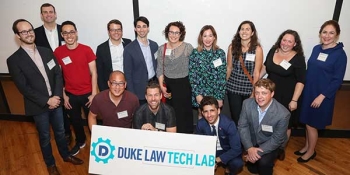Duke Law Tech Lab caps three days of legal technology events with Demo Day

A start-up offering a do-it-yourself divorce platform won the grand prize in Duke Law Tech Lab’s second annual Big Ideas Demo Day competition, capping three days of events devoted to showcasing emerging legal technologies and innovative companies and entrepreneurs leading them.
Seven legal and civic service start-ups that were previously chosen to participate in the Tech Lab, a 10-week virtual accelerator program, presented at Demo Day on Oct. 5. A panel of judges awarded three prizes and the audience of about 120 lawyers, entrepreneurs, investors, and students chose their favorite.
Hello Divorce, which offers an alternative to retaining a divorce attorney through its on-demand self-service platform, fixed-fee managed divorce services, and à la carte legal help, took home the grand prize of $5,000. Erin Levine, founder and chief executive, and Jennifer Heller, co-creator and chief creative officer, presented on behalf of the company.
“Start-up land is lonely and having the opportunity to meaningfully connect with like-minded individuals and teams doing innovative work in the legal space was one of my favorite aspects of the accelerator,” said Levine, a family lawyer in Northern California who started Hello Divorce last year.
Second prize and the Audience Favorite Award went to Smart Lien, which allows construction professionals to file liens quickly through a mobile-optimized website and avoid the time and expense of hiring attorneys — often cost-prohibitive for small businesses and low lien amounts.
“Participating in the Duke Law Tech Lab was a boost for our new company, and it came at the perfect time,” said Smart Lien co-founder Brandt McMillan, a partner in a Nashville law firm who practices real estate and construction law. “We learned a lot about how to grow and improve our services and made many good connections. Above all though, the program provided us with invaluable validation and legitimacy.”
Disputly, a dispute resolution platform for smart contract-based transactions and distributed economies that is designed to minimize risks and costs while maximizing efficiency and customer retention during and after the dispute resolution process, won third prize.
“We’ve always intended the Duke Law Tech Lab not only as a way to bring innovation to the law school but also as a means to help foster the next wave of legal technology leaders,” said Jeff Ward ’09, director of the Duke Center on Law & Technology and associate clinical professor of law. “We think it’s notable that our winning teams all serve to expand direct-to-consumer legal services and, we hope, narrow the access-to-justice gap. That’s a win for everyone.”
Demo Day was held at the Bullpen, Duke’s hub for innovation and entrepreneurship in downtown Durham. Sponsors for the Tech Lab are Latham & Watkins, Thomson Reuters, and Travelers Insurance plus North Carolina community sponsors Smith Anderson and Lawyers Mutual Liability Insurance Company of North Carolina.
The event followed a day of activities devoted to legal technology and entrepreneurship at the Bullpen. The Duke Center on Law & Technology and the Duke Law & Technology Society hosted law students from Duke, UNC-Chapel Hill, and Wake Forest law schools for the Legal A.I. Showdown, in which teams were given the challenge of building a tool for analyzing legal contracts using artificial intelligence.
Jim Wagner ’93 and Steve Harber, executives at Seal Software, provided training for the students, and Duke alumni Ian Walker LLMLE ’15 and Scott Ripps T’91 were also on hand to help. The winning team was Dean Yu, Mariam Turner, and Rana Odeh from UNC.
Later that day, Ward facilitated a design thinking workshop that aimed to re-imagine ways of measuring attorney success and project progress for nearly 40 law students, faculty, lawyers, and other stakeholders.
“As much as we want to consider how technology can reshape the delivery of legal services, we also want to encourage the creative capacities that make such reshaping possible,” he said. “At this session we considered how we might measure success beyond the billable hour, but many, many legal institutions are ripe for redesign, and we had a lot of fun doing it.”
Earlier in the week at Duke Law School, the International Legal Tech Summit featured presentations from six companies with legal technology products at various stages of development: Alexi (Canada), Athennian (Canada), Legalicity (Canada), Nikkah Builder (U.S.), OneLegem (Argentina), and Vaultedge (India). The event, which attracted more than 30 students, was sponsored by the Duke Center on Law & Technology, Duke Law Career Center, Duke Law International Studies, and Lawyers Mutual Liability Insurance Company of North Carolina.